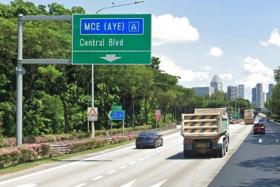Keeping traditions alive
Despite challenges, Teochew pastry shop owner hopes to keep business going
The owner of this traditional Teochew pastry shop, which has been around since the 1960s, is glad he is on the National Heritage Board's (NHB) intangible cultural heritage survey list.
The reason: Mr Lawrence Lim, 43, says it just might attract young people to learn the trade and keep Gin Thye Cake Maker going.
He said: "I'm very happy because this industry needs all the help it can get to keep all these traditions."
Mr Lim, a second-generation owner, took over the business when his father died 14 years ago.
When The New Paper visited Mr Lim at his flagship store in Sembawang yesterday, the father of five said: "I don't know if my son will take over so I have to change the business model to modernise.
"So if my children don't want to take over, somebody else can get Gin Thye Cake Maker to its 100th year to continue this culture."
He said that out of all his children, ranging from 14 months to 15 years, only his two-year-old son seems interested in playing at the shop. It reminds him of his own days growing up at the shop.
Gin Thye Cake Maker has been making Teochew wedding gifts, which include tau sar piah (bean paste pastry) and candies, for the past 52 years and has four branches island-wide.
Mr Lim said they sell about 40,000 boxes of such wedding gifts a year and each box costs $20.
Despite those numbers, customers are buying fewer boxes now compared to the past.
Mr Lim told TNP: "People in the kampung used to order 80 boxes each for weddings but now, everybody's more modern with no time to give such traditional gifts, so it's now up to 30 boxes per customer.
"The younger generation don't follow traditions, unlike the older generation who have more of the human touch."
As such, he is looking at re-branding his business and coming up with new products to keep up with the times.
Renovating the flagship shop for the first time since opening and changing the packaging of the wedding gift boxes are some ways Mr Lim wants to change the business.
He said he would like to create modern products and wants to reach markets in Hong Kong, Taiwan and China.
For example, in November last year, he added durian mochi to his menu.
This industry needs all the help it can get to keep all these traditions.
- Traditional Teochew pastry shop owner Lawrence Lim on being on the 'intangible cultural heritage' survey list
NHB's Cultural heritage survey
Starting today, National Heritage Board (NHB) will compile a list of what they call intangible cultural heritage. Intangible cultural heritage refers to skills, practices and knowledge that communities view as part of their culture.
The survey is expected to take 16 months and last till early 2018.
Mrs Rosa Daniel, chief executive officer of NHB, said that researching Singapore's heritage is not only about the past, it also helps to shape the future.
She added: "It is thus vital that we continually enhance, and add to, our knowledge bank of Singapore's history."
The five categories of such intangible cultural heritage are:
- Oral traditions and expressions, for example, folktales and legends.
- Performing arts, such as traditional Chinese puppetry, dikir barat (traditional Malay art combining music, dance and singing) and bharatanatyam (Indian classical dance).
- Social practices, rituals and festive events, for example, Qing Ming Festival, Thimithi (Hindu firewalking ritual) and Peranakan cuisine.
- Knowledge and practices concerning nature and the universe: Fengshui, traditional medicine ( like Chinese medicine, jamu and Ayurveda)
- Traditional craftsmanship, such as food heritage ( like chilli crab, nasi padang, murtabak and Teochew cakes and pastries) and traditional industries (like joss-stick makers, traditional Indian goldsmiths and coffee grinders).
NHB announces 20 Heritage sites
National Heritage Board (NHB) is also revealing 20 buildings and sites on its online heritage portal today as part of its tangible heritage survey. Tangible heritage refers to physical buildings of historical and cultural interest.
The survey was first launched last September and is expected to be completed in mid-2017.
NHB would like the public to submit their memories, photographs and videos of the buildings and sites to the online portal.
Mrs Rosa Daniel, chief executive officer of NHB, said the submissions will help to fill in possible gaps in existing information.
Some of the buildings include Plaza Singapura, Maxwell Road Food Centre and Paya Lebar Airbase. For the full list of buildings and to submit your stories, go to Roots.sg
Get The New Paper on your phone with the free TNP app. Download from the Apple App Store or Google Play Store now


